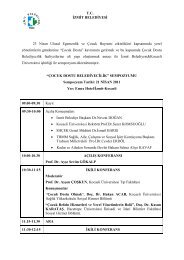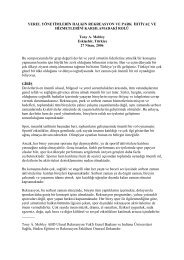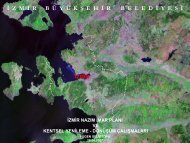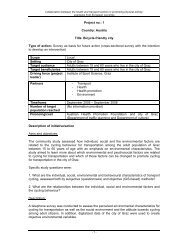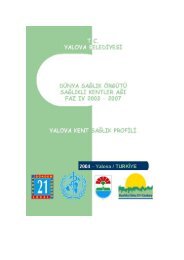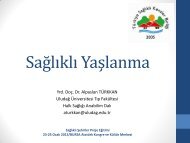WHO HIA Sub-network Training Report
WHO HIA Sub-network Training Report
WHO HIA Sub-network Training Report
You also want an ePaper? Increase the reach of your titles
YUMPU automatically turns print PDFs into web optimized ePapers that Google loves.
• Support with teaching people how to do a <strong>HIA</strong> and why, i.e. advantages versus difficulties<br />
and how to manage the difficulties<br />
• Developing specific tools and indicators, finding evidence, stakeholder consultation<br />
(appropriate model, skills)<br />
• Experiences from others, sharing and learning from cities<br />
Q. Highlight 3 things that you learnt on this course:<br />
All responses are included:<br />
• Presentation and facilitation skills are very important for an <strong>HIA</strong> training course<br />
• If you show adequate evidence it is possible to effect the decision makers and you can<br />
provide appropriate evidence by way of <strong>HIA</strong><br />
• It is very important to hear participants experiences of <strong>HIA</strong> and their experience of<br />
working with politicians<br />
• To understand who are the real stakeholders<br />
• To support people<br />
• Enhanced skills to work with politicians and engage them in the process throughout<br />
• Negotiations and facilitation skills<br />
• Reminded of the importance of governance and accountability<br />
• Key aspects of reporting results, report writing and making recommendations = ‘consider’<br />
recommendations<br />
• Improvement of presentation skills<br />
• Some important methodological issues regarding <strong>HIA</strong> processes and approaches<br />
• Important issues on decision-making process<br />
• More aware of the positive aspect of <strong>HIA</strong> and differences between <strong>HIA</strong> and EIA<br />
• Basic differences between <strong>HIA</strong> and Health needs assessment or Health technical<br />
assessment<br />
• Don’t make suggestions/recommendations before identifying all health impacts<br />
• To undertake an appraisal<br />
• Greater understanding of who should be the stakeholders<br />
• The full <strong>HIA</strong> process is much longer and wider than I have experienced before<br />
• We are all beginners<br />
• Not to be afraid of starting a full <strong>HIA</strong> process – others have done it and succeeded<br />
• Presentation skills/attitude<br />
• Basic skills to develop own tools (screening and scoping criteria)<br />
• Basic skills on how to introduce people to <strong>HIA</strong> and how to run basic exercises<br />
• Many cities have done various things, there is a lot to learn from<br />
• The more you hear of <strong>HIA</strong>, the more complicated it sounds<br />
Q. Please specify any future training needs you may have<br />
• To observe the application of an <strong>HIA</strong> especially performing evaluation with stakeholders<br />
• To teach people and to convince them<br />
• A one day advanced train the trainer course – mainly on training skills, presenting <strong>HIA</strong> in<br />
a simple, practical and effective manner<br />
• Specific training for step 3 ‘Appraisal’<br />
• Don’t know yet. We need to get some practical experiences before we can identify the<br />
next training needs<br />
• Specific tools and indicator development<br />
• Evidence finding and producing: stakeholder consultation (appropriate models, skills)<br />
15



